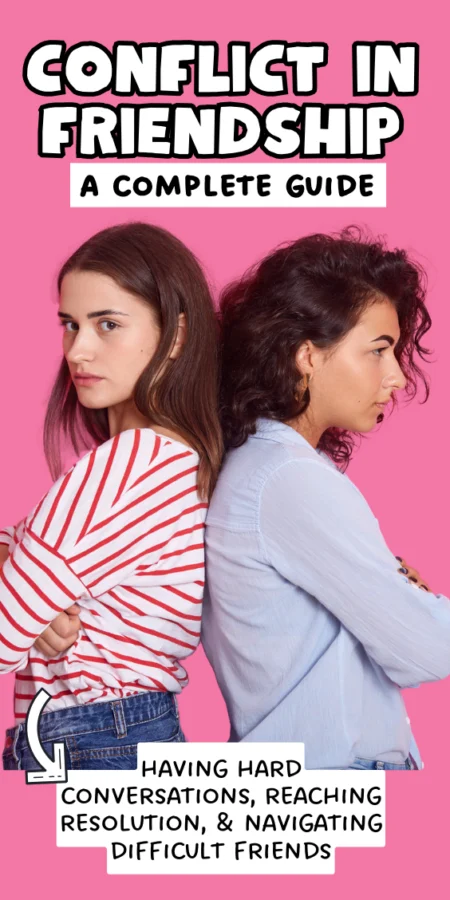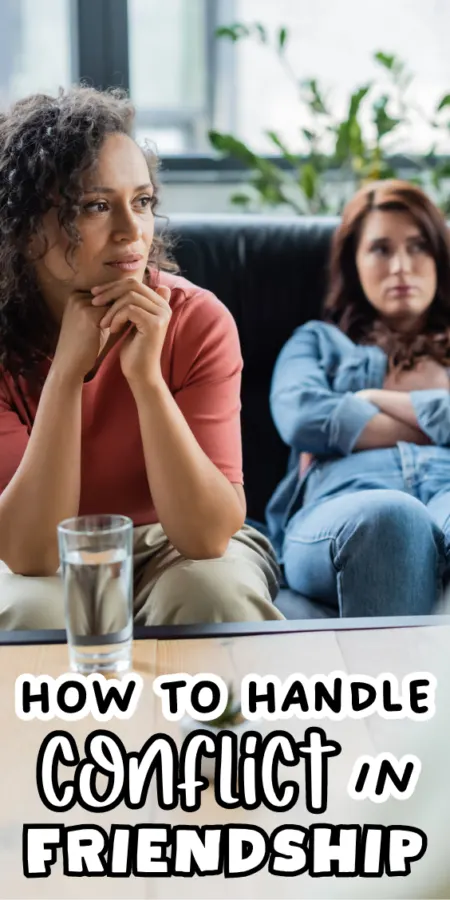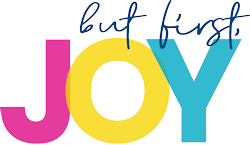If you struggle to navigate conflict in friendships – you aren't alone. There’s a gray area when it comes to these types of issues. I'm sharing my best tips for resolving these tough times productively and respectfully.

More than your average person, I know a thing or two about falling in and out of friendships. From childhood B.F.F.s to soul friends to tragically losing my best friend to being ghosted and more… I’ve had my fair share of experiences, from beautiful to heartbreaking. Every friend I’ve had has deeply impacted me in many ways. While my experiences are plenty, I've consistently taken away how precious friendships are.
I hope my experiences can help you overcome the friendship conflict that you may be experiencing.
What causes conflict in friendships?
To begin, can we just acknowledge how taboo it is to discuss conflict resolution in friendships, as adults? In my experience, and from what I’ve witnessed so many times before, friendship issues are often swept under the rug or lead to the end of the relationship.
Is that always the case? Absolutely not. Disputes don’t always lead to resentment or friendship breakups. If handled properly, your friendship can become more solid than ever before.
So, why are these exchanges so deeply uncomfortable? Why does it feel so different when arguing with a friend than with a spouse or relative?
Expectations for the Friendship
We subconsciously enter into friendships with expectations of what the connection should be. This isn't necessarily a bad thing. Our relational experiences, the media we consume, and the company we keep give us a picture of what connection should look or feel like.
As children, friendship is about playfulness, fun, and laughter. As adults, we pile on the expectations of support, compassion, consideration, and effort. In fact, those are all friendship green flags.
It's when we place unrealistic expectations on one another that conflict can arise and be very difficult to navigate.
Some examples of unrealistic friendship expectations could be:
- expecting a ‘yes man', who agrees with everything.
- expecting to be the only friend.
- no boundaries.
- we can say hurtful things without repercussions.
- to know exactly what we need them to be for us.
- having an open invite to everything.
- to enjoy everything we enjoy.
- no conflict or disagreements.
- to be included in every outing.
- for my friend to be friends with my other friends.
- to be responsible for our feelings.
Think of it like this: Friendship is a partnership without the commitment that a marriage or business would have. Because of that, it can merely end without a conversation or closure. There is no dissolution of friendship. In most situations, nobody has to move out or return items. It can just be… over.
That adds an entirely new element to how we handle conflict in friendships.
Lack of Boundaries
Another reason conflict can arise amongst friends is due to our lack of boundaries. Boundaries are important in every relationship, even with our children. Whether we speak them clearly or hold them within, we need to stand strong in those boundaries.
If you need a place to start when setting boundaries with friends, take a look at these friendship red flags. When we stand firm with everyone in our lives, others will have no choice but to respect us or leave us.
When we lack boundaries, we teach others that it's okay to treat us in any way they choose. A lack of boundaries leads to a lack of respect. When someone doesn't respect you, they don't treat you well.
Deep Vulnerability
Another common reason conflict occurs in friendship is because we tend to be deeply vulnerable with our friends. We open ourselves right up and show the deepest parts of who we are. We may tell them things we've never shared with others. Being vulnerable increases the risk of being hurt.
When we trust someone so much that we share these things with them, we tend to put them on a pedestal. In a way, we glamorize the individual. So, a simple disagreement can make you feel blindsided. One may think, “Wait, you're supposed to have my back”.
This is when we need to remember the complexity of being human. We can have the same core values and deep, personal respect for someone but still not agree on everything. Even the most genuine individuals may say or do something hurtful.
With deep vulnerability comes deep emotions, which can easily turn into conflict. And, that is okay.

Is conflict important in a friendship?
Conflict opens up an opportunity for more growth and understanding in the friendship. Confronting issues head-on can help establish boundaries. Disagreements can also help show one's true intentions and character. The way someone handles hard things can say a lot about them.
Do they remain respectful? Do they shut down or avoid the conflict entirely? Do they take accountability for their actions? Do they raise their voice or name-call? Do you do any of these things?
Depending on the type of friendship you have, identifying why someone handles conflict can help open up more meaningful conversations. Past traumas, childhood patterns, and generational cycles are at play in those situations.
That said, conflict can be beneficial to a friendship.
So, conflict is healthy?
If handled well and to an extent, yes. However, we must practice clear communication, understanding, respect, and honesty when confronting a friend.
Well, Anne Dahlauser at ibelieve.com said it best, “Conflicts aren’t endings.”
How to deal with friendship conflict:
First and foremost, you have to have a conversation. There is no way around it. Avoidance is not an option. If you care about the friendship, a conversation is a must.
When we choose to have a hard conversation, it’s because we care about the friendship. We want, not only to be heard and understood but to find a resolution. We want the friendship to be better because of the issue at hand.

The tips I'm sharing will be useful for mature, adult friendships. These tips are for anyone looking for a way to approach a friend about something uncomfortable, yet necessary.
1. Set boundaries.
As mentioned above, setting boundaries is a must in friendship. Just as importantly, we need to vocalize our boundaries when handling conflict.
For example, you could be very clear that you are not okay with yelling when having a hard talk with your friend. If said friend does raise their voice, immediately ask that you reschedule or regroup when your boundaries can be respected.
2. Be aware of body language.
It can be difficult to control our body language because it tends to happen unconsciously. Plus, we cannot necessarily see the faces we are making during a conversation. What we can do, however, is be respectful of the person we are talking to.
A few things to avoid when confronting a hard situation with a friend are:
- Eye-rolling
- Sighing
- Shaking head
- Tapping leg
- Crossed arms
- Slouching in seat
- Not making eye contact
If the goal of your conversation is to resolve and remain as friends, then do your best to maintain welcoming body language.
3. Check in with yourself.
Throughout the conversation, it's important to do a mental check-in. Are you feeling too overwhelmed to think or speak clearly? If you can no longer communicate effectively, it would be wise to take a moment or some time to revisit the conversation later. If you begin to raise your voice, apologize and lower it. Take deep breaths. Ground yourself.
4. Give grace.
When discussing emotionally-fueled topics with a friend, the best approach is to give grace. Understand that someone may not be their best self during conflict. Being willing to cooperate and listening with curiosity, rather than being argumentative, is the best way to reach a positive conclusion.
It's important not only to give grace in the conversation but also in the situation you're dealing with. Think about the kind of friend they have been to you. Is this the first conflict you've had with them? If so, be understanding of their why.
Remember, forgiveness is for you to let go. Be open-minded and receptive.
5. Use ‘I' or ‘I feel' statements.
This is a tip I learned in therapy. Using ‘I' statements is the best way to express your needs and feelings without the other party feeling attacked. When an individual feels attacked, they immediately put walls up and become defensive. Henceforth, an argument brews and nothing is accomplished.
When you keep the conversation about your feelings and not about what the other person has done wrong, you are expressing vulnerability. That sort of softness is much easier to receive. In the end, it's truly all about hurt feelings and the conversation should focus on that.
6. Make it clear why the conversation is needed.
Above all, we need to express why we want to address the conflict in the first place. Was there a misunderstanding? Do you need to set boundaries? Were your feelings hurt? Are you angry? Identify the why and vocalize it.
7. Take accountability.
One of the most important tips I can give when in conflict with anyone is to take accountability. If you didn't handle things the way you should, say that. Never let your ego get in the way of settling an issue with someone you love. We are imperfect people. Allowing the other party to see that you recognize these things in yourself may open the door for them to do the same.

8. Don’t step out of character.
We mustn't abandon who we are in the heat of the moment. Even I have found myself reverting to old, toxic communication patterns when facing conflicts in friendship. Why? Because my ego and body are protecting me. I didn't have the best example of overcoming difficulty growing up, so I'm constantly a work-in-progress.
Practice mindfulness in these moments. Try to think about your tone, body language, and how the other individual is absorbing what you're saying. Keep calm, remain clear, and stand firm. Name-calling, saying hurtful things, and refusing to listen are all toxic communication styles. Stepping out of character can often make the situation worse.
9. Discuss your needs and expectations moving forward.
One of the biggest tools I've acquired in therapy is how to express my needs. The fact is, we are not mind-readers. We can't expect anyone, even our closest friends, to know exactly what we want or need in every situation. If something doesn't make you happy, say it. That is the only way for changes to be made.
When reaching the end of the conversation with a friend, don't leave out your needs and expectations moving forward. Likewise, ask what they need or want from you in the future. Here are a few examples of how you can ask:
- “Moving forward, what can I do to prevent something like this from happening again?”
- “What do you need from me, as a friend?”
- “How would you have liked for me to handle this situation better?”
- “Did I do something to trigger you? Please let me know so I can be more sensitive to that in the future. I care about you and would never want to make you feel unsafe with me.”
- “How can I better serve you as a friend?”
10. Offer resolution.
Finally, we offer resolution which is typically the goal for the entire conversation. This can be with an apology or forgiveness. A resolution can look like making plans together or even cracking a joke at the end.
In a mature, adult conversation, the resolution would be both individuals directly stating how they will move forward in a better way.
How to deal with a difficult friend
When dealing with a so-called “difficult” friend, conflict can feel much bigger than it needs to be. If your friend is not receptive to what you're saying, being argumentative or aggressive, not offering resolution or taking accountability – it may be time to be very firm. Express how important it is to overcome this conflict and ask if they would like to reschedule when they are more open to talking.
If you've tried time and time again, it may be time to step away from the friendship.

What if there is too much conflict within the friendship?
When is conflict too much? I'd venture to say that a lot of conflict in a friendship is a red flag in itself. Friends are there to make our lives more enjoyable. If you are finding yourself to be anxious, uncomfortable, and stressed when around a specific friend – that is not healthy.
Some conflict in friendship is healthy, a lot is not.
In conclusion, I'd like us all to remember that we are all human. We make mistakes and can say/do very hurtful things, sometimes. Maybe we are carrying unhealed friendship wounds or are inexperienced with real adult friendship.
Regardless of the why, we need to decide if the friendship is more important than the setback. Has the person shown you who they are consistently? Or, are they joy suckers? Are they there when you need them the most? Or, is the friendship toxic?
Weigh the pros and cons but always remember, good friends are the Golden Eggs of life. They are rare and so incredibly valuable. We all wish for one and sometimes, we get lucky and find it. People dream and pray for adult friends, so if you've found a good one – hold onto it.
After all, friends are the ones who choose to stay. There is not an oath to upload or vows to keep. They aren't blood-related and obligated to show up for functions. They are there because they want to be there. How beautiful is that?
